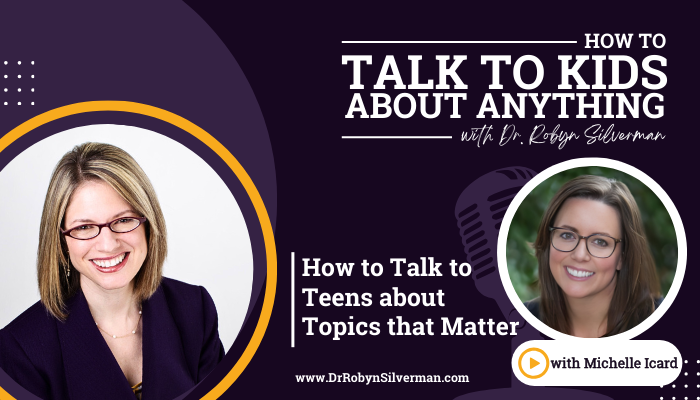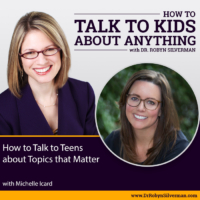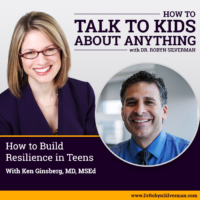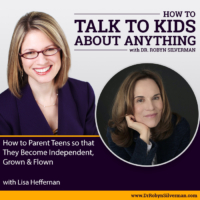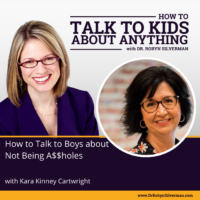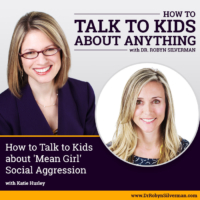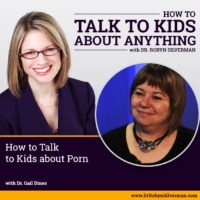Podcast: Play in new window | Download
Subscribe: Apple Podcasts | RSS | More
How to Talk to Tweens about Topics that Matter
This podcast episode focuses on talking to tweens about topics that range from sexuality and technology to the changing parent-child relationship. How do you approach tweens so that both people feel heard? Michelle Icard suggests the BRIEF method which stands for: Begin peacefully, Relate to your child, Interview to collect information, Echo what you’re hearing, and give Feedback.
On this podcast- we talk about talking to kids every week—and we’ve been doing it for years. So I guess I’m preaching to the choir when I say how important it is to do it—even when it’s challenging. One extra challenging time to try to engage children in important discussions is in during the tween years—I know this both professionally and personally- given that my children are now 12 and almost 11 years old. A double whammy tween spectacular! Yes; trying to convince a middle schooler to listen to you can be exasperating at times. So it’s not surprising that some parents simply feel that the best option is not to talk! But keeping kids safe, informed and prepared makes conversations necessary.
Before we get to my next fabulous guest who will be talking to us about a host of wonderful and sometimes cringe-worthy topics, I wanted to announce 2 things. First, thank you to all of you who have been listening over the years as we are at about 950K downloads and on our way to a million. And I just am so appreciative of your amazing reviews on iTunes- so heartfelt and kind- and of your listenership. You are amazing. Second, my book, currently entitled How to Talk to Kids about Anything, is coming along and will be published in 2022 by Sourcebooks. I’ve already written the chapters on talking to kids about mistakes and failure, talking to kids about sex, talking to kids about death and right now- I’m working on talking to kids about big feelings and coping. With your loyalty and support, I’m putting my head down and writing. So thank you all once again. I’ll keep you posted about what’s going on with the book from week to week, since many of you have been so amazing to ask. I just adore you all.
For today, we will be focusing on talks with tweens—what to do, what definitely NOT to do, and how to use the BRIEF B-R-I-E-F model to Begin peacefully, Relate to your child, Interview to collect information, Echo what you’re hearing and give Feedback from my friend and colleague, Michelle Icard- who has been with us once before when we discussed a different aspect of helping middle schoolers thrive.
Begin peacefully,
Relate to your child,
Interview to collect information,
Echo what you’re hearing
give Feedback
Bio
Michelle Icard is a member of the Today Show parenting team and NBC News Learn. The author of Middle School Makeover, her work has been featured in the Washington Post, Chicago Tribune, The Christian Science Monitor, Redbook, Time, and People. Her leadership curriculum for middle schoolers, Athena’s Path and Hero’s Pursuit, have been implemented at schools across the U.S., and her summer camp curriculum is offered at more than 20 camps each summer. She has written a new book called Fourteen Talks by Age Fourteen where she explored some essential conversations that we need to have with our tweens before high school starts—which we will be discussing today. She also has an online companion course that goes with the book at MichelleIcard.com She lives with her family in Charlotte, North Carolina.
Important Messages:
- Successful conversations: Botox brow- important tip! Nothing to do with what you say and everything with how you look while doing it. Brains are rewiring in tween years. While that’s happening, their ability to read facial expressions is compromised. The prefrontal cortex is under construction. They are relying on the amygdala. Studies looking at MRIs- how are they feeling? Scrunched up forward- assumes that the parent is angry. Pretend you have been overly botoxed! Neutral expression can invite conversation. Scrunched forehead stops conversation. Tell your child that you aren’t angry.
- Assistant manager. Paradigm shift. Used to make all decisions regarding identity up to that point. (i.e. decide friendships, style- you made the play dates, you bought the clothes).
- Remember the worst manager you ever had: What were the ways you’d describe them? Bad communicator, micro-manager, intrusive on time, etc. Flip that around. Now you have the job description of how to be the assistant manager rather than the micromanager. So if you feel like a manager was overly controlling- how can you make sure you are stepping back? How can you let your tween take the lead role? How can you take the supporting role? How can I support you in this? Do y ou need help figuring this out? We have wisdom and experience- but tweens need to practice to gain the experience. Don’t try to fix. Be curious. They need internal barometer.
- Changing parent-child relationships. Storm of change. Body, social world, brain. Explain to them- what these changes look like, how you can be supportive. Even our relationship is going to change a bit- more things on own, I’m here on own.
- Feeling shut out? You and everyone else is going through this. Around age 11- individuation. When this happens- job of language to tie groups of people together and it’s the job of tweens and teens to break ties apart. That’s what they need to do to grow up.
- Bridge- open up conversation. BRIEF model. Kids are beginning process of pulling away, suspicious of motives. Don’t want to jump to feedback before doing the rest. They give advice. They need you to reestablish rapport.
- Kids cocoon.
- “I like that you are focusing on your homework and the backseat works for you and it’s comfy (compliments) also I want to spend time with you. If it’s not the car, what can it be? Walk? Lunch? Happy to keep back seat- but what’s in it for us too?
- Conversation crashers- that end a conversation. Raise awareness. None of us are perfect. More aware- maybe correct some of the time.
- BRIEF: Begin peacefully- schedule a time to talk! Recognize that they love their room and friends and ask when would be a good time to chat. Rapport- I used to love my room too! We are on the same team, not here to bust you. I- Interview. Ask questions. What do you love to do? What is your favorite part? E- Echo. Repeat. Like “oh, I see you love this about your room, it’s a drag you have the same color as when you were a baby…” F- Feedback. This is your chance. Don’t lean in. I’m glad you get to spend time in here. Is there a compromise we can come to? I see you love your room and get why- also you are an important part of this family and we value you- we want time together too. Independence and valued. Compromise.
- Tween friendship: “who your kid is friends with is their choice, not yours.” Parents get highly emotional about this. Our pain stays raw. If we see our children being treated badly- our minds go crazy and we think of what used to be a problem for us.
- Wheel is falling off the cart in middle school. Real concerns. Academic. Social. Trial and error (and error and error and error). It will be okay!
- In friendships, you will see that your child is with someone who doesn’t seem to care about them at all—and your child will be that person is someone else’s life too! Learning about how to handle it when someone texts about you (gossips) or doesn’t want to celebrate your wins and is only there when things are going badly. The idea is to help your kid come up with how to deal with these problems. Not for you to diagnose it and come up with the prescription.
- Instead of: I notice that your friend treats you badly and you can’t hang out with them any more. You need to learn now to hang out with those people. Say: How do you feel when you are together? Texting? Anything you love about this friendship? Is there anything about this friendship that you would fix if you had a magic wand?”
- Our approach of fixing things sends our kids under ground and behind our backs. They need to learn how to manage these situations on their own.
- Kids this age make a ton of mistakes and some of them are fashion related.
- Nothing to do about how another kid presents.
- Probing: How do people react to the way they dress? (You may come off as being judgmental and then the child may not come to you about meatier things).
- Avoid: anything to do with looks, appearance, dress.
- Involved: Risky behavior. If knew someone was drinking. Step in. Safety issue/. They can hang out here at our home- but that’s where it will remain right now until I am sure about your safety and wellbeing.
- What do you want to do about this situation?
- ***Big feelings. Explosive or dormant and seep out in covert ways. Things to do when they feel cruddy. How feel bring up the conversation? “Try this first” list. What are things that you like to do- that are enjoyable- calm. She came up with 10 things. “I like to watch puppy videos” Or bake. Shoot basketballs. Don’t have to be profound. Poster- hung behind clothes in closet. Wants mom to fix the feeling. Let’s talk about how you are feeling. Let’s do the try this first- do the thing for 15 minutes. Provided such a distraction- self soothing. Productive conversation after that.
- Janine Halloran- coping mechanisms. Physical, distracting, calming, sensory. Distracting- gives distance. Provides perspective. Also might make them feel better! What works for you might not work for me!
- Technology- like a scissor or hammer- it’s a tool- has benefits and drawbacks. Parents have to do some pre-work before opening the tough tech conversation. What are your biggest concerns? Drill those down. Can’t be so broad. Can’t be everything. What are your concerns? Then, address those. For example, my kid wants IG. I’m worried that (1) They won’t pay enough attention to their real world friends. (2) Their grades will suffer because they will always be online. (3) They might talk to a stranger. (4) They might compare themselves to others and feel bad about themselves and their bodies- develop an eating disorder. Write the list, go down the list, talk about these concerns. Rather than just saying “you aren’t old enough.” They deserve some explanation. What’s dangerous? What works well? What skills do they need in order to be able to use that tool responsibly? Imagine the tool isn’t IG but a stove. You may not let your 7 year old cook dinner while you are outside talking to your neighbor. But you might let your 13 year old do that. What skills do they have?
- Sexuality: Accepting labels. When our child tells us they are bisexual or pansexual- or a friend has told them this- how not to respond. “You’re too young to know.” “Don’t label yourself.” That sends a message to your child that they can’t talk to you about this because you are being dismissive. It sounds like “keep it a secret.” Ask instead; “what’s got you thinking about this?” “Thank you for tell me.” “What can I do to be supportive?” Make sure they are using the right terms. Doesn’t need to be a huge conversation. Careful of the landmine- that this is not appropriate to talk about it at their age. Can have major consequences.
- What about flags or décor around the room that shows their sexuality: Kids are flexible. Kids like to put labels on things. Everything changing. Tumultuous time of life. Labels are a way of making life feel organized. Décor in the room is a way of telegraphic to the world- this is who I am. I’ve made these choices. Might have a pride flag at one point- then replace it with something else at a different time of life.
- Top tip: These conversations are about building rapport over a long period of time. They are not about knowing the perfect thing to say and having the perfect conversation. That will never have. You can have great conversations with your kids if you just keep it up.
Notable Quotables:
- “Kids really need to be able to take some ownership over their decisions regarding who they are, how they present to the world and what they think and believe.”
- “It’s the job of language to tie groups of people together and it’s the job of tweens and teens to break ties apart. That’s why one of the first things that is sacrificed is communication. They stop listening to you. They stop telling you things.
- “This is a time of error and error and error.”
- “When your kid is dealing with a social issue, ask questions. The idea is to get your kid to learn how to connect the dots not for you to diagnosis it and come up with the prescription.”
- “If we just vilify tech, tweens will just tune us out. It’s important to remember that tech can be fun, useful, of service and it can be entertainment. Recognizing that as you begin any conversation is a real good way to keep the door open.”
- “You are the authority on your body. You’re the authority on your feelings. And I’m just here to be your best support team member.”
- “This time of life is so tumultuous. Everything is changing- up in the air all the time and labels are a real neat way to make things feel organized when it’s naturally very chaotic and disorganized.”
- “These conversations are about building rapport over a long period of time. They are not about knowing the perfect thing to say and having the perfect conversation.”
Resources:
IG: @MichelleIcard
MichelleIcard.com

